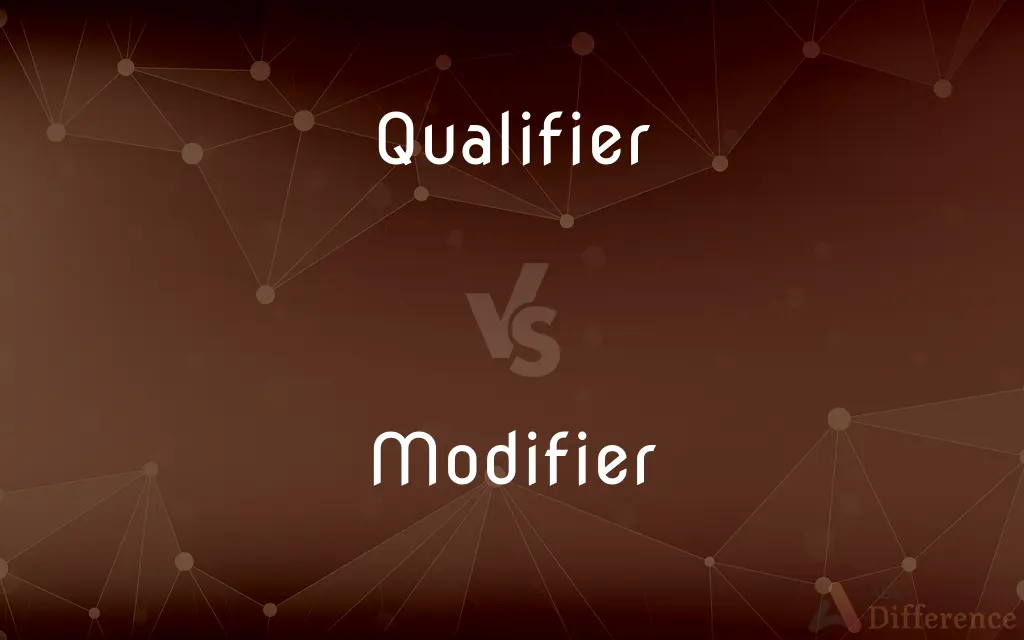Qualifier vs. Modifier — What's the Difference?
Edited by Tayyaba Rehman — By Urooj Arif — Updated on April 20, 2024
A qualifier limits or enhances another word's meaning, emphasizing specificity; a modifier adds descriptive detail to a noun or verb, enhancing clarity and comprehension.

Difference Between Qualifier and Modifier
Table of Contents
ADVERTISEMENT
Key Differences
A qualifier is primarily used to restrict or define the qualities of nouns or pronouns, adding nuances like extent or degree. On the other hand, a modifier generally describes or provides more information about a noun, verb, or adjective, often specifying attributes like color, size, or shape.
Qualifiers can adjust the intensity of a word, subtly changing its meaning. For example, "just" in "just a few" suggests a smaller quantity. Whereas, modifiers typically provide clearer, more vivid details that help paint a more precise picture, like "bright" in "bright red apple."
Qualifiers often serve to either amplify or minimize the scope of a statement, making it more or less assertive. For instance, "merely" suggests limitation as in "merely a suggestion". On the other hand, modifiers can either enhance or diminish the qualities of the words they modify without necessarily affecting assertiveness, as seen in "gently" in "gently flowing river."
In legal and formal writing, qualifiers are crucial for setting precise boundaries within statements, such as "solely" in legal disclaimers. Conversely, modifiers are indispensable in creative writing and journalism for creating imagery or conveying emotions, as in "raging storm."
While qualifiers can sometimes function as modifiers, their main role is to fine-tune meanings rather than to embellish or illustrate, which is the primary function of modifiers in sentences.
ADVERTISEMENT
Comparison Chart
Function
Limits or specifies meaning
Adds detail or description
Usage in a sentence
Often subtly changes the degree or intensity
Provides additional information to paint a clearer picture
Common examples
Just, merely, solely
Bright, gently, quickly
Effect on the sentence
Changes the scope or assertiveness
Enhances or illustrates qualities
Typical contexts
Legal, academic, formal
Narrative, descriptive, creative
Compare with Definitions
Qualifier
A word that clarifies the meaning of another word by adding nuances.
The phrase just five minutes implies a very short time.
Modifier
A grammatical element that enriches narrative by providing detail.
Loudly complained describes the manner of complaining.
Qualifier
An element that enhances precision in communication.
Specifically designed for indicates tailor-made solutions.
Modifier
A descriptive word that adds specificity to nouns or verbs.
A crumbling old mansion paints a vivid picture.
Qualifier
A linguistic tool used to express limitation or possibility.
Possibly the best indicates uncertainty.
Modifier
A word that changes the meaning of another by adding qualities.
Deeply saddened conveys a profound emotion.
Qualifier
A modifier that fine-tunes but does not broadly describe.
Mainly concerned with focuses on a primary aspect.
Modifier
An adjective or adverb that embellishes a sentence.
Rapidly expanding emphasizes the speed of expansion.
Qualifier
An adjective or adverb that adjusts intensity or scope.
Merely a child suggests limitations due to age.
Modifier
A tool for enhancing imagery and emotional impact in writing.
Blindingly bright light evokes a strong visual.
Qualifier
One that qualifies, especially one that has or fulfills all appropriate qualifications, as for a position, office, or task.
Modifier
A word, phrase, or clause that limits or qualifies the sense of another word or word group.
Qualifier
(Grammar) A word or phrase that qualifies, limits, or modifies the meaning of another word or phrase.
Modifier
One who, or that which, modifies.
Qualifier
One who qualifies for something, especially a contestant who qualifies for a stage in a competition.
Modifier
(grammar) A word, phrase, or clause that limits or qualifies the sense of another word or phrase.
Qualifier
A preliminary stage of a competition.
Modifier
(programming) A keyword that qualifies the meaning of other code.
The
protected modifier makes a class member visible to subclasses, but not to external code.Qualifier
(grammar) A word or phrase, such as an adjective or adverb, that describes or characterizes another word or phrase, such as a noun or verb; a modifier; that adds or subtracts attributes to another.
Modifier
(computing) modifier key
Qualifier
A marker that qualifies or modifies another code element.
Modifier
One who, or that which, modifies.
Qualifier
One who, or that which, qualifies; that which modifies, reduces, tempers or restrains.
Modifier
A word or phrase that modifies another word, phrase, or sentence, usually by limiting the scope or restricting the meaning of the sentence element modified.
Qualifier
A contestant who meets certain requirements and so qualifies to take part in the next stage of competition;
The tournament was won by a late qualifier
Modifier
A content word that qualifies the meaning of a noun or verb
Qualifier
A content word that qualifies the meaning of a noun or verb
Modifier
A moderator who makes less extreme or uncompromising
Modifier
A person who changes something;
An inveterate changer of the menu
Modifier
A gene that modifies the effect produced by another gene
Common Curiosities
How do modifiers enhance narrative writing?
Modifiers add depth and vividness to narratives, making descriptions more engaging and visually impactful.
Why are qualifiers important in legal documents?
Qualifiers set precise boundaries in legal language, ensuring clarity and reducing ambiguity.
What is a qualifier in English grammar?
A qualifier is a word that limits or enhances another word’s meaning to add specificity.
How does a modifier function in a sentence?
A modifier provides additional descriptive information, helping to clarify or detail the elements it modifies.
Can a word be both a qualifier and a modifier?
Yes, some words can function as both depending on the context, affecting either the intensity or the descriptive quality of the term they modify.
Is "very" considered a qualifier?
Yes, "very" is a qualifier that intensifies the adjective or adverb it precedes, as in "very happy."
How do qualifiers differ from quantifiers?
Qualifiers modify the scope or intensity of a word, while quantifiers specify the amount or quantity.
What kind of modifier is used to describe emotions?
Adjectives like "joyful" or adverbs like "angrily" modify nouns or verbs to convey emotional states.
Can modifiers create ambiguity in sentences?
Yes, if improperly placed, modifiers can lead to ambiguity by not clearly defining which word they are modifying.
Which type of writing benefits most from the use of modifiers?
Descriptive and narrative writing benefit greatly from modifiers as they enhance the clarity and appeal of the text.
What role do qualifiers play in academic writing?
Qualifiers help to hedge claims, making statements more cautious and academically sound.
What is an example of a qualifier affecting assertiveness?
The word "possibly" reduces the assertiveness of a statement, indicating uncertainty.
How does the use of a modifier affect reader comprehension?
Modifiers can greatly improve comprehension by providing additional context and details that support understanding.
Why is it important to correctly use modifiers in technical writing?
Correct use of modifiers in technical writing ensures precise descriptions and instructions, critical for clarity and safety.
What are some common mistakes made with qualifiers?
Overuse of qualifiers can lead to weakened or overly tentative statements that might undermine the writer’s intention.
Share Your Discovery

Previous Comparison
Windows vs. Mac
Next Comparison
Behaviour vs. PersonalityAuthor Spotlight
Written by
Urooj ArifUrooj is a skilled content writer at Ask Difference, known for her exceptional ability to simplify complex topics into engaging and informative content. With a passion for research and a flair for clear, concise writing, she consistently delivers articles that resonate with our diverse audience.
Edited by
Tayyaba RehmanTayyaba Rehman is a distinguished writer, currently serving as a primary contributor to askdifference.com. As a researcher in semantics and etymology, Tayyaba's passion for the complexity of languages and their distinctions has found a perfect home on the platform. Tayyaba delves into the intricacies of language, distinguishing between commonly confused words and phrases, thereby providing clarity for readers worldwide.














































